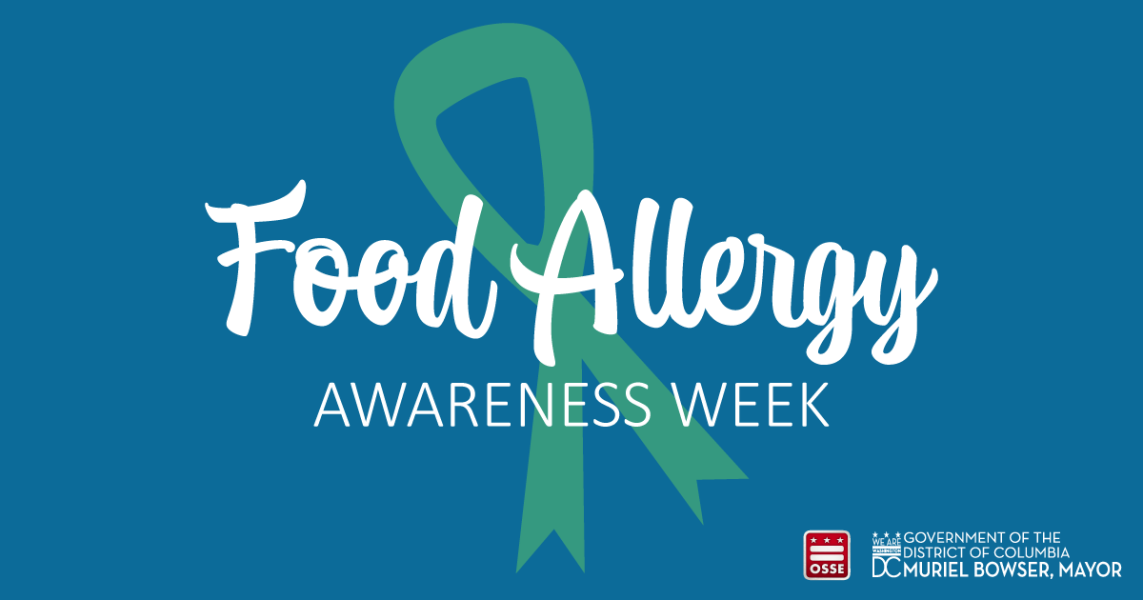
Join the Office of the State Superintendent of Education (OSSE) and the Division of Health & Wellness this May as we celebrate Food Allergy Awareness Week from May 12-18. During this week, we will celebrate, educate and raise awareness about food allergies and anaphylaxis. Each day, we will feature different themes and engagement opportunities.
We all play an important role in creating and maintaining a healthy, safe, and inclusive learning environment for students with food allergies. We encourage everyone in the school community to join us! By everyone, we mean everyone: school administrators, teachers, educational aides, health suite personnel, mental health professionals, food service staff, facilities/custodial staff, students and families.
There are many ways to get involved! Check out our daily themes below as well as a list of activities that can be completed throughout the week, and beyond, to celebrate, educate, and raise awareness about food allergies and anaphylaxis.
For tips to promote Food Allergy Awareness Week click here. For questions, contact OSSE Allergy Management Team at [email protected].
Monday, May 13: Day 1
Food Allergy 101
In the United States, there are 32 million individuals with food allergies, including 5.6 million children under age 18. That’s one in 13 children, or roughly two in every classroom.
More than 15 percent of school-aged children with food allergies have had a reaction in school.
Approximately 25 percent of severe food allergy reactions at school happen to students with no previous known food allergy.
A food allergy is a medical condition in which exposure to a food triggers a harmful immune response, called allergic reaction. This reaction occurs because the immune system attacks proteins in the food that are normally harmless. The proteins that trigger the reaction are called allergens.
While any food can trigger an allergic reaction, there are nine top food allergens that are responsible for 90 percent of all anaphylactic reactions: peanut, tree nut, egg, soy, dairy, wheat, fish, shellfish and sesame, which was added earlier this year.
Avoiding exposure to allergens is the only way to prevent a reaction. For this, it is important to read labels, discourage food sharing, practice proper hand washing, and clean surfaces where food is prepared or consumed.
Reactions are unpredictable and can vary from mild to severe, life-threatening reactions, also known as anaphylaxis. Past reactions to a food allergy do not predict future reactions. You can still have a life-threatening reaction to a food you are allergic to, even if you have never had a serious reaction before.
Epinephrine, also known as adrenaline, is the first line of defense against anaphylaxis. Not treating anaphylaxis promptly with epinephrine increases the risk of fatal reactions. Be prepared to respond to anaphylactic emergencies by making sure that epinephrine is kept in a secure place and that certified staff can get to them quickly and easily.
Share your school’s Undesignated Epinephrine Auto-Injector Plan (UEA Plan) with your school community so that everyone is aware of the protocol for responding to anaphylactic emergencies Students with known allergies should obtain an Action Plan for Anaphylaxis and provide it to their school.
Tuesday, May 14: Day 2
Tuesday Tips
Learn how to prevent food allergic reactions and how to identify and treat anaphylaxis in this recorded webinar for school food service staff: “Tips for Managing Food Allergies in the Cafeteria”.
Haga clic aquí para ver la grabación del seminario web en español.
Share the webinar recording with food service staff at your school!
Wednesday, May 15: Day 3
Wellness Wednesday
Having food allergies can affect the mental health of children with food allergies and their families.
- Learn about the impact of food allergies on students’ mental health in this recorded webinar presented by Food Allergy Research and Education (FARE) (passcode 0WA5+X^r).
- About one-third of children with food allergies report that they have been bullied because of their allergies. Learn how to put a stop to food allergy bullying here.
Share these resources with your school community!
Thursday, May 16: Day 4
Teal Day
Teal represents food allergy awareness. Join us and FARE by wearing a teal shirt or ribbon to raise awareness about food allergies. Get everyone you know to join in!
Take a picture and share it on social media with the following hashtags: #OSSEFoodAllergyAwareness #TealTakeover
For tips to promote Food Allergy Awareness Week click here.
Friday, May 17: Day 5
Fun Friday
Celebrate an Allergy Ally at your school and share their stories using the following hashtags: #AllergyAlly #OSSEFoodAllergyAwareness
You may also nominate yourself or someone you know as an #AllergyAlly for a chance to be featured on FARE's social media platforms here.
Activities and Additional Resources
- Learn more about the Epinephrine in Schools Program Requirements and the Emergency Protocol for Managing Anaphylaxis in District Schools.
- Take OSSE Epinephrine Administration Training for school staff. After completing, you will be certified and prepared to administer epinephrine and support during anaphylactic emergencies at your school.
- FARE Food Allergy Awareness Week 2024
- Expand your knowledge about the law and accommodating students with food allergies by watching this recorded webinar (passcode =+zDz2NB)
- Resources for Parents - Savings Programs for Epinephrine Devices
- Be a PAL Instructional Program (K-12 lessons and handouts)
- Classroom Resources
- Allergy Friendly Recipes
Click here to Access our Media Kit for Schools for tips to promote the Food Allergy Awareness Week.


